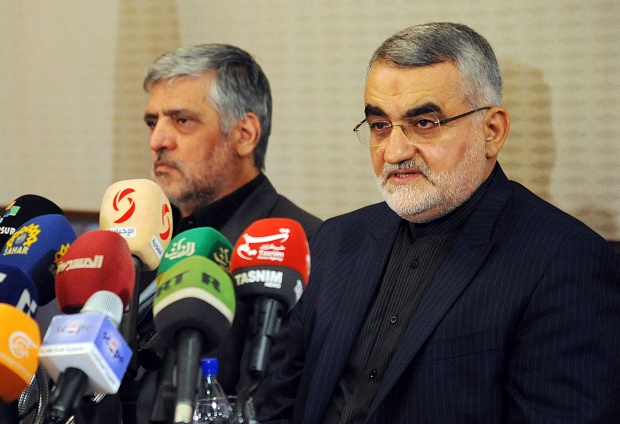
In this photo released by the Syrian official news agency SANA, Alaeddin Boroujerdi, the Iranian head of an influential parliamentary committee on national security and foreign policy, left, speaks during a press conference, Damascus, Syria, Thursday, Oct. 15, 2015. Boroujerdi reiterated his country’s full support for the Syrian government, stressing that a political solution is the only way for Syria to emerge from the current crisis. Boroujerdi’s comments came a day after a regional official said hundreds of Iranian troops are being deployed in northern and central Syria, dramatically escalating Tehran’s involvement in the civil war as they join allied Hezbollah fighters in an ambitious offensive to wrest key areas from rebels amid Russian airstrikes. AP
LONDON — An influential group of lawmakers says launching British airstrikes against Islamic State group militants in Syria would be “incoherent” and ineffective without a plan to end the country’s civil war.
The Foreign Affairs Select Committee has dealt a blow to Prime Minister David Cameron’s attempts to expand British military action against the militants from Iraq into Syria.
Committee chairman Crispin Blunt, a legislator from Cameron’s Conservative Party, said he feared the government was “responding to the powerful sense that something must be done … without any expectation that its action will be militarily decisive, and without a coherent and long-term plan for defeating (IS) and ending the civil war.”
The Royal Air Force is part of a US-led campaign of airstrikes against militant targets in Iraq. But in 2013 British lawmakers unexpectedly rejected the government’s proposal for military action in neighboring Syria.
READ: UK plan to join Syria air strikes threatened by Corbyn | Britain appoints minister for Syrian refugees
Cameron and his defense minister, Michael Fallon, have said they favor expanding the strikes to Syria, but only with the approval of Parliament.
In a report published Tuesday, the foreign affairs committee said Russia’s intervention in the conflict in support of Bashar Assad’s government “has complicated even further any proposed action in Syria by the UK”
It said that without “a coherent international strategy” to end Syria’s civil war, “taking action to meet the desire to do something is still incoherent.”
The committee said the government needs to answer fundamental questions about the proposed airstrikes — including their legality without United Nations approval and whether they would have support from regional powers including Turkey, Iran, Saudi Arabia and Iraq.
Until then, it said, “we recommend that it does not bring to the House a motion seeking the extension of British military action to Syria.”
The committee’s report is not binding on the government, but its warnings will make it harder for Cameron to gain lawmakers’ approval for airstrikes.